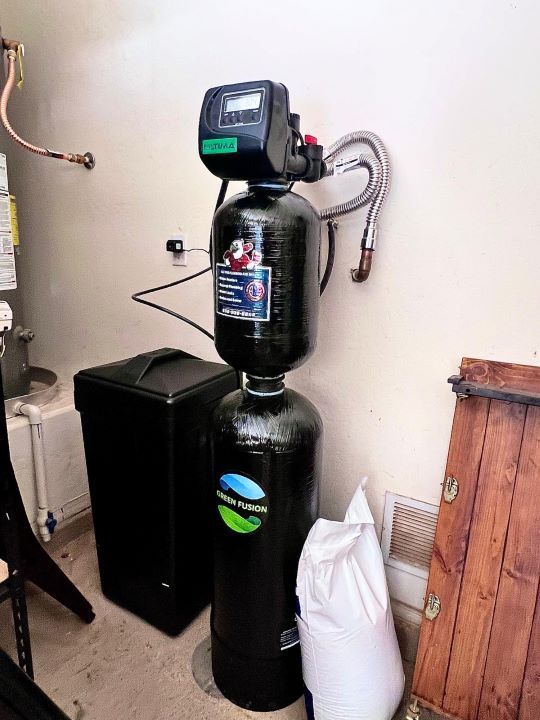Water Softener Installation in Mesa, AZ
Say Goodbye to Hard Water Problems
Hard water can wreak havoc on your plumbing, appliances, and even your skin and hair. At All Time Plumbing and Drains, we specialize in professional water softener installation services tailored to meet the needs of Mesa, AZ, homeowners. With our expert solutions, you can enjoy the benefits of soft water while protecting your home and saving money.
Why Install a Water Softener?
A water softener removes excess minerals like calcium and magnesium, which are responsible for hard water. Here’s how a water softener can transform your home:
1. Protect Your Plumbing
Hard water can cause scale buildup inside your pipes, leading to clogs and reduced water flow. A water softener prevents this, ensuring your plumbing system operates smoothly.
2. Extend Appliance Lifespan
Hard water deposits can damage water heaters, dishwashers, and washing machines. By installing a water softener, you can reduce wear and tear, extending the life of your appliances.
3. Improve Skin and Hair Health
Soft water is gentler on your skin and hair, leaving them feeling clean, hydrated, and free from dryness or irritation.
4. Save Money
By preventing scale buildup, a water softener can improve appliance efficiency, lowering your energy costs and reducing the need for frequent repairs.
Our Water Softener Installation Process
At All Time Plumbing and Drains, we follow a seamless process to ensure top-quality results:
1. Assessment
We begin with a detailed evaluation of your water supply and home’s plumbing needs. This allows us to recommend the best water softener system for your household.
2. Custom Recommendations
Our team will guide you in choosing a water softener that fits your home’s size, water usage, and budget.
3. Expert Installation
Our licensed plumbers will install your water softener efficiently and securely, ensuring it integrates seamlessly with your plumbing system.
4. Testing and Optimization
After installation, we thoroughly test the system to ensure optimal performance and provide instructions on maintenance and care.
Signs You Need a Water Softener
Wondering if a water softener is right for you? Look for these common signs of hard water:
- White, chalky residue on faucets and fixtures
- Stiff, scratchy laundry despite proper washing
- Dry skin and brittle hair after showers
- Frequent plumbing repairs or clogged pipes
- Shortened lifespan of water-using appliances
Frequently Asked Questions
How Long Does a Water Softener Last?
Most water softeners last between 10–15 years with proper maintenance.
Do Water Softeners Require Maintenance?
Yes, regular maintenance, such as replenishing salt and occasional system cleaning, ensures optimal performance. We offer maintenance services to keep your system running smoothly.
Will a Water Softener Remove Contaminants?
Water softeners are designed to remove hardness minerals, not contaminants like bacteria or chemicals. For complete water treatment, consider pairing your water softener with a filtration system.
Our service areas include:- Mesa
- Phoenix
- Tempe
- Chandler
- Gilbert
- Scottsdale
- Glendale
- Peoria
- Surprise
- Goodyear
- Avondale
- Queen Creek
- Apache Junction
- Paradise Valley
- Litchfield Park
- Fountain Hills
- Sun City
- Sun City West


$29.99 DRAIN CLEANING SPECIAL. CALL TODAY!

200+ Online Reviews
Why Choose All Time Plumbing and Drains for Water Softeners?
At All Time Plumbing and Drains, we’re committed to providing top-quality water softener solutions tailored to your specific needs. Here’s why homeowners in Mesa, AZ, trust us for their water softening systems:
1. Expert Installation
Our licensed and experienced plumbers ensure your water softener is installed correctly for optimal performance and longevity. We handle every detail, so you don’t have to worry.
2. Customized Solutions
We understand that every home is different. That’s why we offer personalized recommendations based on your water quality, household size, and budget.
3. Top-Quality Products
We work with industry-leading brands to provide water softeners that are reliable, efficient, and built to last. Our systems are designed to tackle even the hardest water.
4. Transparent Pricing
With All Time Plumbing and Drains, there are no hidden fees. Our upfront pricing ensures you know exactly what to expect before we begin the job.
5. Comprehensive Support
From system selection to maintenance, our team is here for you every step of the way. We even offer ongoing maintenance plans to keep your water softener running smoothly.
6. Local Expertise
As a trusted name in Mesa, AZ, we understand the specific water challenges faced by local residents. Our team has the knowledge and experience to address hard water issues common to the area.
7. Customer-First Approach
Your satisfaction is our priority. We go above and beyond to ensure you’re happy with your new water softener and confident in the quality of our work.
TESTIMONIALS
AREAS WE SERVICE

Se Habla Español
All Time Plumbing and Drains, ofrecemos una amplia variedad de servicios de plomería para satisfacer las necesidades de su hogar o negocio. Desde limpieza de desagües, detección de fugas de agua, y reparación de líneas de agua y alcantarillado, hasta tecnología trenchless (sin zanja), inspecciones con cámara, e instalación de sistemas de filtración de agua. Nuestro equipo está disponible las 24 horas del día para emergencias y se compromete a brindar servicios confiables y de alta calidad. Llámenos hoy para una cotización gratuita y hable con uno de nuestros expertos plomeros en español. ¡Estamos aquí para ayudarle!















